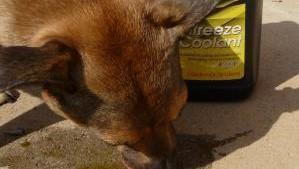Pet Poison Awareness Month: Common Toxins

- posted: Mar. 18, 2023
Pet Poison Awareness Month: Common Toxins
March is Pet Poison Awareness Month so let’s look at some common toxins that can affect our pets.
- Rat/mouse baits: several different kinds exist. The most common are anticoagulant baits that interfere with blood clotting by blocking vitamin K. These products often contain sweet compounds like corn syrup or grains to entice mice to eat them which also makes them irresistible to dogs and sometimes cats. Once ingested, they prevent the blood from clotting so pets who have eaten rat bait may present with coughing or trouble breathing, nose bleeds, pale gums, weakness and bruising. Pets can bleed into their chest, lungs or abdomen. Symptoms often present 2-3 days after ingestion as it takes a few days for vitamin K stores in the body to be completely used up. Other newer rodenticides may cause neurologic damage and seizures, or kidney or heart problems. Anticoagulant bait ingestion is treatable with Vitamin K if caught early, but there is no antidote for the other types of bait.
- Xylitol—this artificial sweetener commonly found in sugar-free gum and candy can cause a severe drop in blood sugar and can also cause liver damage in dogs and cats. Seek immediate veterinary assistance if you suspect your pet has ingested a substance containing xylitol and be sure not to feed pets sugar free peanut butter, yogurts or other foods that may contain xylitol.
- Speaking of foods, there are several toxic foods that should never be fed to dogs or cats. Chocolate and coffee, of course, are quite toxic to our pets—caffeine and other compounds can cause vomiting, seizures, increased heart rate. Grapes/raisins can cause kidney failure in pets, onions and garlic can cause a form of anemia, and unbaked yeast dough can ferment and expand in the stomach causing bloat and alcohol poisoning. Beer and other alcohol is also toxic and can cause liver damage in our pets.
- Lilies—many flowers in the lily family are extremely toxic to cats. Eating any part of a lily--leaves, flowers, pollen, stems—will cause kidney failure in cats in only a few hours even with minor ingestion. Keep lilies away from cats and seek immediate veterinary care if you suspect your cat may have ingested a lily as toxicity can be fatal.
- Antifreeze—ethylene glycol in antifreeze and some de-icer windshield washer fluids is highly toxic to dogs and cats. It often has a sweet flavor, and pets may be poisoned when licking or drinking antifreeze. Only a small amount can cause kidney failure in pets within hours or days. An antidote exists, but prompt treatment is needed to prevent serious complications and death.
Be sure to keep ALL medications, plants and chemicals out of reach of pets and be cautious with toxic foods and artificial sweeteners. If an accidental ingestion does occur, call a pet poison control hotline (there is usually a fee for calling, but they provide valuable lifesaving information for your pet) and seek veterinary attention immediately for your pet. Your vet may induce vomiting, give activated charcoal to prevent further absorption and your pet may need IV fluid support and other medications. If an antidote exists, it will also likely be given. In most cases, prompt treatment can save your pet’s life.
Important numbers: Pet Poison Helpline-855-764-7661 ASPCA Animal Poison Control 888-426-4435
This blog brought to you by the Patton Veterinary Hospital serving Red Lion, York, and the surrounding communities
https://www.petinsurance.com/healthzone/pet-health/pet-toxins/most-common-pet-toxins/
Location
Patton Veterinary Hospital
425 E Broadway
Red Lion, PA 17356
